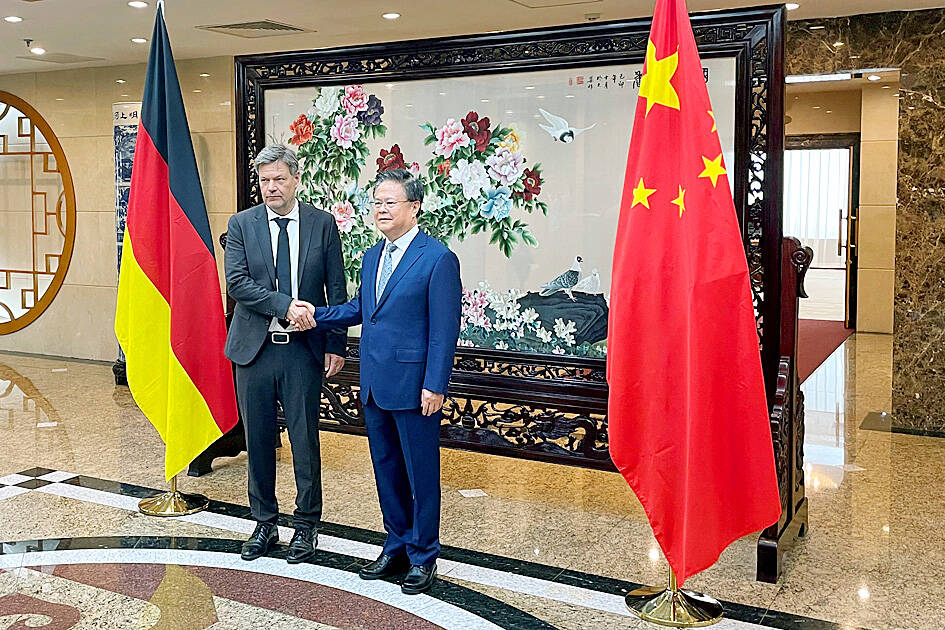The US Department of the Treasury on Friday fleshed out a proposed rule that would restrict and monitor US investments in China for artificial intelligence (AI), computer chips and quantum computing, while the German economy minister in China yesterday said that the EU’s door is open for discussions regarding tariffs on Chinese exports.
Washington’s proposed rule stems from US President Joe Biden’s executive order in August last year regarding the access that “countries of concern” have to US dollars that fund advanced technologies, which the US government says would enhance their military, intelligence, surveillance and cyber capabilities. The order identified China, Hong Kong and Macau as countries of concern.
The proposed rule outlines the required information that US citizens and permanent residents must provide when engaging in transactions in the area, as well as what would be considered a breach of the restrictions.

Photo: Reuters
It specifically would prohibit US investors from funding AI systems in China that could be used for weapons targeting, combat and location tracking, among other military applications, said a senior Treasury official who previewed the rule for reporters on condition of anonymity.
The Treasury is seeking comment on the proposal through Aug. 4, and after that is expected to issue a final rule.
In Beijing yesterday, German Minister for Economic Affairs and Climate Action Robert Habeck told Chinese officials that proposed EU rules on Chinese goods are not a “punishment.”
Habeck’s visit to China is the first by a senior European official since Brussels proposed hefty duties on imports of Chinese-made electric vehicles (EVs) to combat what the EU considers excessive subsidies.
“It is important to understand that these are not punitive tariffs,” Habeck said in the first plenary session of a climate and transformation dialogue.
Countries such as the US, Brazil and Turkey had used punitive tariffs, but not the EU, he said. “Europe does things differently.”
Habeck said that for nine months, the European Commission had examined in great detail whether Chinese companies had benefited unfairly from subsidies.
“Common, equal standards for market access should be achieved,” Habeck said.
Meeting Chinese National Development and Reform Commission Chairman Zheng Shanjie (鄭珊潔) Habeck said the proposed EU tariffs were intended to level the playing field with China.
“We will do everything to protect Chinese companies,” Zheng said.
Proposed EU import duties on Chinese-made EVs would hurt both sides, he added.
After his meeting with Zheng, Habeck spoke with Chinese Minister of Commerce Wang Wentao (王文濤), who said he would discuss the tariffs with EU Commissioner for Trade Valdis Dombrovskis yesterday evening via videoconference.
“What I suggested to my Chinese partners today is that the doors are open for discussions and I hope that this message was heard,” Habeck said in Shanghai later. “This opens a phase where negotiations are possible, discussions are important and dialogue is needed.”

INVESTIGATION: The case is the latest instance of a DPP figure being implicated in an espionage network accused of allegedly leaking information to Chinese intelligence Democratic Progressive Party (DPP) member Ho Jen-chieh (何仁傑) was detained and held incommunicado yesterday on suspicion of spying for China during his tenure as assistant to then-minister of foreign affairs Joseph Wu (吳釗燮). The Taipei District Prosecutors’ Office said Ho was implicated during its investigation into alleged spying activities by former Presidential Office consultant Wu Shang-yu (吳尚雨). Prosecutors said there is reason to believe Ho breached the National Security Act (國家安全法) by leaking classified Ministry of Foreign Affairs information to Chinese intelligence. Following interrogation, prosecutors petitioned the Taipei District Court to detain Ho, citing concerns over potential collusion or tampering of evidence. The

‘FORM OF PROTEST’: The German Institute Taipei said it was ‘shocked’ to see Nazi symbolism used in connection with political aims as it condemned the incident Sung Chien-liang (宋建樑), who led efforts to recall Democratic Progressive Party (DPP) Legislator Lee Kun-cheng (李坤城), was released on bail of NT$80,000 yesterday amid an outcry over a Nazi armband he wore to questioning the night before. Sung arrived at the New Taipei City District Prosecutors’ Office for questioning in a recall petition forgery case on Tuesday night wearing a red armband bearing a swastika, carrying a copy of Adolf Hitler’s Mein Kampf and giving a Nazi salute. Sung left the building at 1:15am without the armband and apparently covering the book with a coat. This is a serious international scandal and Chinese

Seventy percent of middle and elementary schools now conduct English classes entirely in English, the Ministry of Education said, as it encourages schools nationwide to adopt this practice Minister of Education (MOE) Cheng Ying-yao (鄭英耀) is scheduled to present a report on the government’s bilingual education policy to the Legislative Yuan’s Education and Culture Committee today. The report would outline strategies aimed at expanding access to education, reducing regional disparities and improving talent cultivation. Implementation of bilingual education policies has varied across local governments, occasionally drawing public criticism. For example, some schools have required teachers of non-English subjects to pass English proficiency

TRADE: The premier pledged safeguards on ‘Made in Taiwan’ labeling, anti-dumping measures and stricter export controls to strengthen its position in trade talks Products labeled “made in Taiwan” must be genuinely made in Taiwan, Premier Cho Jung-tai (卓榮泰) said yesterday, vowing to enforce strict safeguards against “origin laundering” and initiate anti-dumping investigations to prevent China dumping its products in Taiwan. Cho made the remarks in a discussion session with representatives from industries in Kaohsiung. In response to the US government’s recent announcement of “reciprocal” tariffs on its trading partners, President William Lai (賴清德) and Cho last week began a series of consultations with industry leaders nationwide to gather feedback and address concerns. Taiwanese and US officials held a videoconference on Friday evening to discuss the